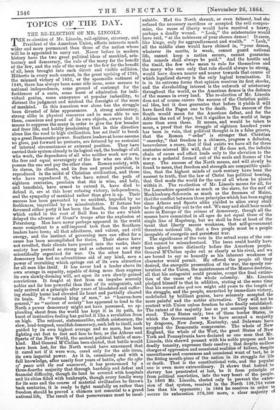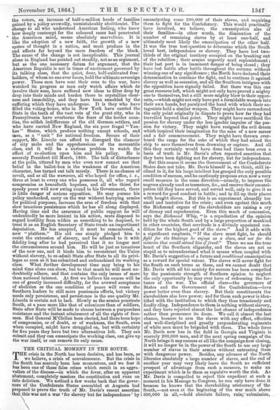TOPICS OF THE DAY.
THE RE-ELECTION OF MB. LINCOLN. THE re-election of Mr. Lincoln, rail-splitter, attorney, and President of the American Union, affects interests much wider and more permanent than those of the nation whose will he is appointed to carry out. Never before in modern history have the two great political ideas of mankind, aris- tocracy and democracy, the rule of the many for the benefit of the few, and the rule of the many or the few for the benefit of all, been brought into such direct and visible collision. Hitherto in every such contest, in the great uprising of 1789, the misused victory of 1831, or the spasmodic outburst of 1848, there has always been some side issue, some menace to national independence, some ground of contempt for the feebleness of a caste, some burst of admiration for indi- vidual genius, some annoyance at popular imbecility, to distract the judgment and mislead the foresight of the mass of mankind In this American war alone has the struggle been divested of false appearances. A strong aristocracy, strong alike in physical resources and in men able to use culable. Had the North shrunk, or even faltered, had she refused the necessary sacrifices or accepted the evil compro- mise, the cause of liberty would have received a heavy, perhaps a deadly wound. "Look," the aristocracies would have said, "at the nobleness of your chosen demos! It cares, like kings, only for aggrandizement and wealth." "Look," all the middle class would have chimed in, "your demos, whatever its merits, is weak, cannot guard national life, cannot keep a nation secure, cannot guarantee that consols shall always be paid." And the hostile and the timid, the few who mean to rule for themselves and the many who care only that rule should always be strong, would have drawn nearer and nearer towards that course of which legalized slavery is the only logical termination. It is in its extreme forms that opinion receives its first shocks, and the slaveholding interest is the outwork of aristocracy throughout the world, as the American demos is the defence of the masses in every land. The re-election of Mr. Lincoln does not of course ensure the success of the Christian politi- cal idea, but it does guarantee that before it yields it will have faced the Pagan one to the death. The success of the South would mean for the American defeat, and for the African the end of hope, but it signifies to the world at large more than even these. It means, and would be taken to mean, a proof that the struggle of eighteen hundred years has been in vain, that political thought is in a false groove, that the Roman "order" is stronger that Christian "anarchy," that freedom is a chimera, progress a delusion, benevolence a snare, that if God exists we have all for three centuries misread His will, that if He does not, the infinite chain of cause and effect leads only to the elevation to the few on a pedestal formed out of the souls and frames of the many. The success of the North means, and will slowly be found to mean, that freedom and strength are compatible quali- ties, that the highest minds of each century have been the nearest to truth, that the law of Christ has political bearinc, , that God made the world for the use of all whom he placed within it. The re-election of Mr. Lincoln means for all, for- the Lancashire operative as much as the slave, for the serf of Mecklenburg-Schwerin as much as the freeman of Maine, thatthe conflict between those principles which has been raging since Athens and Sparta alike yielded to alien sway shall be fought steadily out to the end. We may and shall hear much more in Europe of the crimes of democracy, though all the masses have committed in all ages do not equal those of the single line of Hapsburg, but we shall be free at least of the taunt that liberty means weakness, that self-government threatens national life, that a free people must be a people incapable of energetic and persistent war.
The significance of the vote in the actual scene of the con- flict cannot be misunderstood. The issue could hardly have been placed more distinctly before the American people. General M'Clellan spoke out as clearly as his rival, and we are bound to say as honestly as his inherent weakness of character would permit. He offered the people all they desired, the energetic prosecution of the war, the speedy res- toration of the Union, the maintenance of the Monroe doctrine, all that his antagonist could promise, except the final extinc- tion of the cause of the whole calamity. Mr. Lincoln pledged himself to that in addition, stating at the same time that his second sine qua non might add years to the length of the struggle, and the people, unexcited by immediate victory, undeluded by brilliant genius, have solemnly accepted the more painful and the nobler alternative. They will not be content with Union unless freedom be also finally established. The extent of the majority has as yet scarcely been under- stood. Three States only, two of them border States, in which the Government was to have secured a majority by dragoons, New jersey, Kentucky, and Delaware have accepted the Democratic compromise. The whole of New England, the whole of the West, the great States of New York and Pennsylvania have declared as one man that Mr. Lincoln, this shrewd peasant with his noble purpose and his. deadly tenacity, expresses their resolve ; that despite endless charges of oppression and occasional realities of failure, despite uncouthness and coarseness and occasional want of tact, be is the fitting mouth-piece of the nation in its straggle for life or death. That is the constitutional vote, and the popular one is even more extraordinary. It shows that hatred to slavery has penetrated at last, be it from principle or from political conviction, into the very heart of the people. In 1860 Mr. Lincoln, elected only to prevent the exten- sion of that system, received in the North 138,704 votes less than his opponents ; in 1864 he receives in order to secure its exhaustion 378,500 more, a clear majority of the voters, an increase of half-a-million heads of families gained by a policy avowedly, unmistakeably abolitionist. The change to all who understood American feeling, who knew how deeply contempt for the coloured races had penetrated " the American mind, seems absolutely marvellous. It is like the adoption of a new faith, the growth of a new 8rtena of thought in a nation, and must produce in the end effects far beyond the mere freedom of the black. The cause of the change is not inexplicable. This journal alone in England has pointed out steadily, not as an argument, but as the one necessary datum for argument, that the American Republic is not in times of excitement governed by its talking class, that the quiet, dour, half-cultivated free- holders, of whom no one ever hears, hold the ultimate sovereign power. These men have sent their sone to the war, have watched its progress as men only watch affairs which do involve their sons, have suffered new ideas to filter drop by drop into their minds and harden there to crystalline clear- ness and immobility, and they have been ennobled by the suffering which they have undergone. It is they who have filled the voting-boxes, who in New York have carried the State in the teeth of the vast vote of the great city, who in Pennsylvania have overborne the fears of the border coun- ties, the selfish indifference of the old German settlers, and who have carried New England, the six poor frugal " Yan- kee " States, which produce nothing except schools, and men, as a " unit " for national freedom. Secure of their support, Mr. Lincoln can afford to disregard the clamour of city mobs and the apprehensions of the mercantile .class, and it will be a curious problem to watch the effect of re-election upon him and his policy. He is securely President till March, 1869. The talk of disturbance at the polls, uttered by men who even now cannot see that belief in the ballot-box is the weakness of the American character, has turned out talk merely. There is no chance of revolt, and as all the waverers, all who hoped for office, 1. e., three at least to every one who possesses it, all who regard compromise as henceforth hopeless, and all who thirst for speedy peace will now swing round to his Government, there is little danger of serious opposition. He may pursue his policy unchecked, carry on the war without hurrying armies for political purposes, increase the area of freedom with that slow tenacious persistence which he has all along displayed. Having time and the assurance of public support he will undoubtedly be more lenient in his action, more disposed to regard hostility from within as something to be despised, to treat it as an English Secretary of State treats an impertinent deputation. He has accepted, it must be remembered, a new "platform." His old one simply pledged him to resist the extension of slavery, and he adhered to it with fidelity long after he had perceived that it no longer met the circumstances around him. He will be just as tenacious of the new one, and it binds him to reconstruct the -Union without slavery, to re-admit State after State to all its privi- leges as soon as it has submitted and enfranchised its working class. What further development time may bring to his mind time alone can show, but to that much he will most un- doubtedly adhere, and that contains the only issues of more than national interest. At first we believe his course will be one of greatly increased difficulty, for the avowed acceptance of abolition as the one condition of peace will rouse the Southern leaders to still more passionate efforts, but victory needs only persistence, and persistence is the one quality Mr. Lincoln is certain not to lack. Slowly as the armies penetrate South, at a pace more like that of colonizers than of soldiers, State after State will be made to choose between a purposeless resistance and the instant attainment of all the rights of free- men. Had General M'Clellan been elected, had there been hope of compromise, or of doubt, or of weakness, the South, even when occupied, might have struggled on, but with certainty for five years they have but two alternatives left. They can submit and they can emancipate the working class, can give up the war itself, or can remove its only cause.



































 Previous page
Previous page